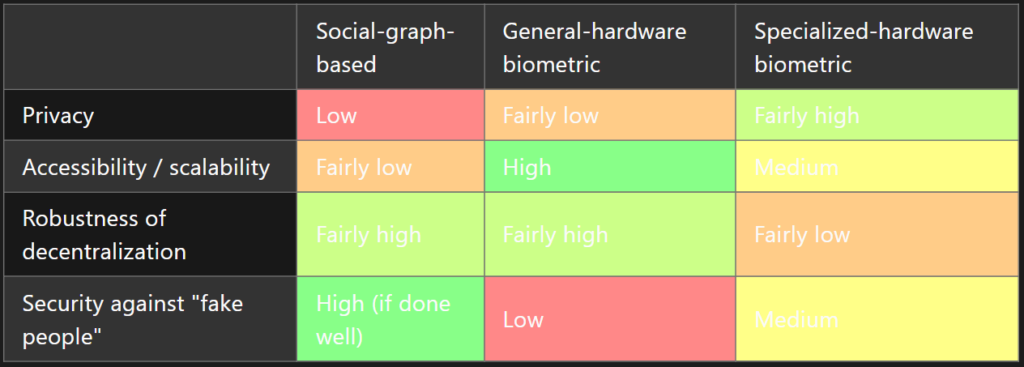Worldcoin was founded in 2019 by OpenAI CEO Sam Altman, Max Novendstern, and Alex Blania, with the goal of providing a “global financial and identity network based on proof of Personhood”. Since its inception, the project has been the subject of much debate regarding various aspects of proof of Personhood, including privacy, centralization, security, and accessibility. In his blog post “What do I think about biometric proof of Personhood?” Vitalik provides a clear and comprehensive explanation of the proof of the proof of Personhood landscape and the concepts mentioned earlier.
Worldcoin is a biometrics-based proof of Personhood project that utilizes specialized hardware devices called Orb to scan people’s iris. Its main USP is privacy, leveraging the advantages of owning Orb.
Worldcoin’s regulation obstacle and skeptical perspective from users
Most data managers believe that iris is a form of biometrics, similar to fingerprints, and can contain sensitive data. As a result, iris scanning is considered a data collection activity that carries potential risks and requires compliance with national data protection regulations.
This has long been a legal obstacle in the project’s global expansion plan, as there are concerns about potential personal data privacy rights violations. Several countries, including Kenya, India, Brazil, France, Germany, the United Kingdom, Hong Kong, and most recently Spain, have launched investigations into the project due to its use of iris scanning.
That being said, privacy plays a crucial role in establishing Worldcoin’s credibility and gaining easier acceptance from governments and users. Therefore, many of the improvements made by Worldcoin aim to enhance privacy, preventing the leakage of user information and fostering a more sincere approach toward countries that may allow the placement of Orbs in their locations.
Recent updates to enhance privacy
1. Personal custody
On March 22, Worldcoin introduced a new feature called “Personal Custody.” This feature allows World ID owners to have the autonomy to store and encrypt their biometric data, providing users with peace of mind regarding their data.
As previously known, Worldcoin employs blockchain technology to establish a digital identification system called World ID, which can be seen as a global digital passport. This is achieved by scanning the user’s iris using a device called the Orb. After the iris scanning process, the user’s data is stored in Worldcoin’s data repository and is scheduled to be deleted according to the predetermined “Data Custody” protocol. In this protocol, users do not have the option to make decisions regarding their personal data.
With the introduction of “Personal Custody,” the biometric data collected by the Orb, used for verifying World ID, will be stored on the user’s device. Subsequently, this approach gives users control over the flow of their data – not just deletion, but any future use prior to being deleted.
"For Worldcoin, giving you control over your data flow with Personal Custody is a significant step towards solidifying the project’s user-centric architecture and building an even more robust and secure World ID network." - Worldcoin Foundation
2. Unverification
On April 9, Worldcoin introduced new features – the ability for World ID holders to unverify their World IDs by permanently deleting their iris codes.
World ID is private by design. It leverages cutting-edge technology like zero-knowledge proofs (ZKPs) to protect the holder’s public key from being known or tracked across applications and to protect World ID use from being tied to any biometric data. It can also be verified and used without any information like name, email address, phone number, etc. - Worldcoin Foundation
The process of unverifying a World ID involves the permanent deletion of the user’s iris code, which is a numerical representation of their unique iris texture. This iris code ensures that each individual can only have one verified World ID. Once the deletion request is made, the individual’s World ID will become invalid. To prevent fraudulent activities, a six-month cool-off period will be implemented, during which individuals will not be able to immediately re-verify their humanness.
At the end of the cool-off period, users’ iris codes will be permanently deleted and rendered unrecoverable.
The development of Worldcoin’s new unverify option involved consultation with third-party experts in privacy and security, including the Bavarian State Office for Data Protection Supervision (BayLDA).
The information provided in this article is for reference only and should not be taken as investment advice. All investment decisions should be based on thorough research and personal evaluation.






